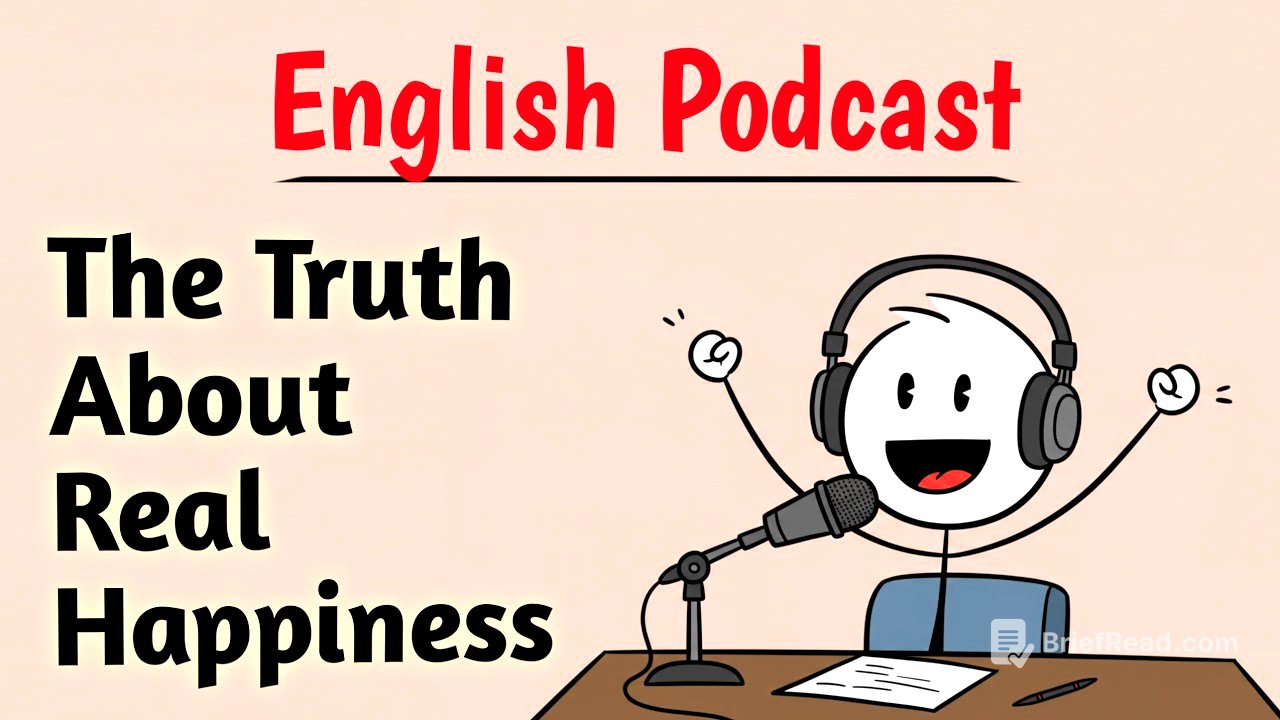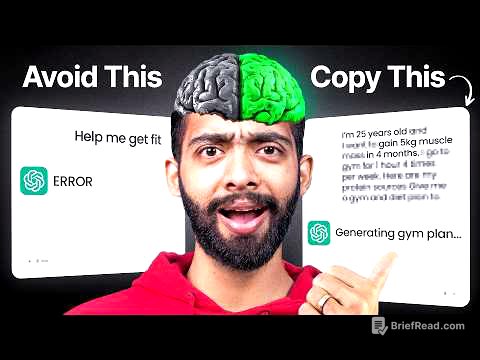TLDR;
This video explores the common misconception that happiness lies solely in future achievements and material wealth. It emphasizes the importance of finding joy in the present moment, practicing presence, decluttering our lives, and understanding the true meaning of wealth, which includes health, peace, love, and strong relationships. The video also addresses the dangers of burnout and highlights the significance of gratitude, personal values, and sharing with others. Ultimately, it encourages viewers to balance their pursuit of money with the cultivation of inner happiness and to recognize that true wealth is found in the simple, meaningful aspects of life.
- Happiness is not always in the future; it's in the present moment.
- True wealth includes health, peace, love, time, and relationships, not just money.
- Clutter affects not only your house but also your mind.
- Giving and sharing create happiness for both the giver and the receiver.
- Rest and stillness are essential to avoid burnout and maintain well-being.
The Illusion of Future Happiness [0:00]
Many people mistakenly believe that happiness is always in the future, tying it to achievements like a better job, a bigger house, or more money. This mindset is dangerous because life is happening now, and constantly waiting for a future moment to be happy can lead to missing out on the present. The story of a hardworking friend who postponed enjoyment until retirement, only to find his health failing, illustrates that happiness cannot be indefinitely delayed. Small, ordinary moments like the sound of birds, a sip of tea, or a loved one's smile are valuable and often overlooked sources of joy that money cannot buy.
The Power of Presence [2:01]
Presence is defined as being fully engaged in the current moment, without dwelling on the past or worrying about the future. Often, people are physically present but mentally elsewhere, which diminishes their happiness. True happiness arises from being present in simple activities, such as mindfully drinking tea, actively listening to a friend, or observing nature. These acts of presence can bring more joy than any expensive possession.
The Impact of Clutter [2:52]
Clutter refers to having too many possessions, which can lead to a feeling of emptiness despite a home filled with things. Reducing clutter can bring clarity and help individuals focus on what is truly important. The experience of a woman who donated many of her belongings and felt lighter and more free demonstrates that decluttering not only cleans the house but also clears the mind.
Redefining True Wealth [3:43]
True wealth is not just about money in the bank; it encompasses health, peace, love, time, and relationships. A wealthy person who is sick, lonely, or stressed cannot fully enjoy their money, while someone who is healthy, has good relationships, and sleeps peacefully possesses real wealth. Giving to others is also a significant aspect of wealth, as it enriches the heart and brings happiness. Science supports this, showing that helping others leads to greater happiness and longer lives.
Avoiding Burnout [5:16]
Burnout occurs when individuals work excessively without rest, pushing themselves beyond their limits. While many believe that constant work leads to success, it often results in stress, illness, and unhappiness. The speaker shares a personal experience of burnout, emphasizing that rest is not a sign of failure but a necessary component of success. Resting and taking care of one's health provide more energy for productive work and contribute to overall happiness.
The Value of Time and Stillness [6:04]
Time is more valuable than money because it is finite and irreplaceable. The happiest memories often involve connection with loved ones rather than material possessions. A simple evening with family, sharing stories and laughter, can be priceless. Slowing down and practicing stillness, without distractions like phones, allows individuals to see clearly, feel deeply, and connect with what truly matters. Life is short, and focusing on laughter, love, and meaningful relationships leads to true happiness.
The Power of Small Things and Presence [7:18]
Happiness is often found in small, ordinary moments rather than grand achievements. The sound of birds, the smell of bread, or a child's hug can bring immense joy. Being present in these moments is crucial, as true happiness arises when one is fully engaged in the present, not lost in worries or distractions. Clutter, both physical and mental, can hinder this presence, while simplicity allows for a clearer focus on what truly matters.
Wealth Beyond Money and the Joy of Giving [11:38]
Real wealth extends beyond financial assets to include good health, peaceful sleep, loving relationships, and a calm mind. Giving to others is a key component of this wealth, as it brings joy and enriches the giver's life. Even small acts of kindness, like a poor man sharing his bread with a hungry child, create moments of priceless happiness.
Balancing Success and Well-being [12:43]
Burnout is a significant issue that arises from overworking without rest, leading to exhaustion and health problems. Success is not solely about doing more but also about knowing when to stop and rest. Rest is essential for gaining new energy and enhancing creativity and productivity. Time is a valuable treasure that should be spent on meaningful connections and experiences rather than solely on chasing money.
The Essence of Happiness and Gratitude [15:23]
Happiness is often found in small things and requires a shift in perspective to recognize it. The world often promotes the idea that more is better, but true happiness comes from recognizing what is enough. Gratitude is a powerful key to happiness, involving a heartfelt thank you for the blessings in one's life. Keeping a gratitude journal can change one's mindset, focusing on what is already present rather than what is missing.
Value, Sharing, and Balanced Living [17:36]
Personal value is not determined by one's paycheck but by who they are, how they live, and how they treat others. Kindness and compassion are more valuable than money. Sharing with others reminds individuals that they are part of a larger community and brings happiness to both the giver and the receiver. To balance money and happiness, one should prioritize needs over wants, spend time wisely, practice gratitude, avoid clutter, give and share, and prioritize rest to protect their energy and live fully. True happiness is an internal state found in choices, gratitude, presence, and love, not in external possessions.




![혼자 있을 때 가장 행복한 한국인들...? 대한민국은 어쩌다 관용이 제일 없는 나라 됐을까? ㅣ경쟁 교육 2부 [이게웬날리지]](https://wm-img.halpindev.com/p-briefread_c-10_b-10/urlb/aHR0cDovL2ltZy55b3V0dWJlLmNvbS92aS85REdteU9oRHNFay9ocWRlZmF1bHQuanBn.jpg)




